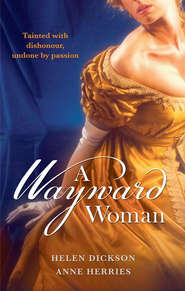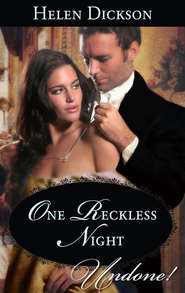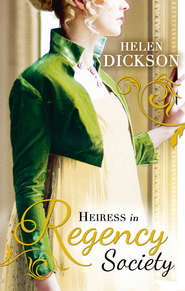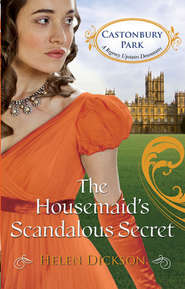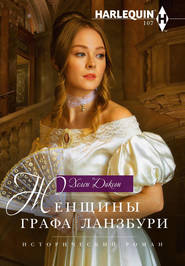По всем вопросам обращайтесь на: info@litportal.ru
(©) 2003-2024.
✖
The Property of a Gentleman
Настройки чтения
Размер шрифта
Высота строк
Поля
Eve winced, the very idea of her beloved home being mortgaged to pay off Gerald’s gambling debts and falling into the greedy hands of moneylenders and suchlike angering her beyond words. But there was nothing she could do.
‘Which is why your father made quite sure his financial affairs were put in order before he died.’
‘It’s a pity he did not consider putting me before his financial affairs,’ Eve remarked bitterly. ‘It seems to me that I was as much his property as Atwood Mine.’
‘But a more desirable property,’ Marcus smiled, his expression softening.
‘Am I?’ she remarked coldly. ‘I’m glad you think so, Mr Fitzalan, but that does not alter the fact that you cannot have one without the other—or, at least, you cannot have the mine without me, whereas you would not have me without the mine by choice.’
Marcus frowned with annoyance. ‘You do me an injustice, Miss Somerville. I am not nearly as mercenary as you make me out to be.’
‘And I have every reason to think you are,’ she shot back at him, referring to their encounter three years ago. ‘But what if I do not agree to marry you? And if my father thought so highly of you, why did he not leave Atwood Mine to you outright, knowing how important it is to you? It would certainly have avoided all these complications and I would not be faced with the daunting prospect of marrying a man not of my choosing—a man I have every reason in the world to despise. I could as easily have gone to Cumbria to live with my grandmother—or to London to my Aunt Shona.’
‘He knew that—just like he knew you would see the sense in what he was asking of you. I tend to share Mr Soames’s view.’
‘And that is?’
‘That, if it were not for his untimely death, he would have explained it to you himself—and to me. He probably believed you would fall prey to all manner of fortune hunters if you were left alone.’
‘What? Two thousand pounds is hardly a fortune, Mr Fitzalan.’
‘Two thousand pounds is a great deal of money to men who have nothing, Miss Somerville. Perhaps the conditions he laid down were his way of making sure you would be taken care of. Do not forget that your father desired only your peace of mind and future happiness. You must believe that.’
‘Which is why he has suggested making you my keeper, is that not so, Mr Fitzalan?’ she said scathingly. ‘However, I do not need you or anyone else to tell me what my own father desired for me,’ she said, lowering her head so he would not see the tears collecting her eyes.
‘Your husband—not your keeper,’ Marcus contradicted in a low voice.
‘Nevertheless, I confess I am bewildered by all this. It’s a riddle I cannot begin to comprehend. I always believed I knew how his mind worked—but it seems I was wrong. I would like to know why, knowing how I feel about you, he has used what can only be described as emotional blackmail to virtually force me into marriage with you. If I decide not to abide by his wishes, and I am sorely tempted not to,’ she said rebelliously, ‘then Gerald will stand to benefit enormously.’
‘That is true—and I implore you to consider his wishes seriously.’
Eve sighed deeply, so confused her head was spinning. Since her mother’s death and the onset of her father’s illness, she had stubbornly refused to consider the future and what it would mean to her when the inevitable happened, but now the future was with her and she was unprepared for the life that was being thrust at her. When she spoke a touch of anger had come to add to the bitterness of her disappointment.
‘Oh, I shall. I always knew how much my father’s work meant to him—Atwood Mine and all his other concerns—but it did not occur to me until now that he would allow his loyalty to all that, and to you, to affect his dealings with me, his daughter. Please—you must excuse me,’ she said quickly. ‘All this has come as something of a shock. I need some time to myself.’
‘Of course. I fully understand. I am leaving myself presently. I realise that you are your own mistress—but anger is a bad counsellor. Do not allow it to influence your decision, and do not foolishly refuse what is your due.’ He sighed. ‘We both have much to think about. I shall return to Burntwood Hall when you’ve had time to recover from today and we can talk seriously about what is to be done,’ he said, standing aside to let her pass.
‘Yes—thank you,’ she said stiffly. ‘Goodbye, Mr Fitzalan.’
Marcus watched her go, staring thoughtfully after her. Meeting Eve Somerville for the first time in three years had been like being a contestant in the first round of a boxing match. She was possessed of the most formidable temper he’d ever witnessed in a woman, having a tongue that could flay the meanest man, gladly stamping on his pieces of lacerated flesh before finally pulverising them into dust with the heel of her pretty foot.
He realised that the lady was a termagant, but he sensed she had a magic quality—if she chose to use it. Troubled, he turned to go back to Alex Soames, his expression tightening, his brows drawn together in an ominous black line when he continued to think of her.
He had felt a slight sense of shock the first time she had looked at him fully, when her grandmother had brought her to be introduced to him after the funeral. There was something in her eyes that set his pulse racing and he felt a great sense of excitement—as he had on that other occasion when he had had her at his mercy three years ago. She looked very young—almost a child—yet he already knew that behind the childlike exterior there was a ripe sensuality just bursting to be set free.
Instinctively, he knew that no matter how in control and confident she might conceivably be, she had that bewitching quality that could well captivate a man and enslave him for life—a burgeoning femme fatale. Yet, when he recollected how outspoken she had been at the reading of the will, of the insult she had thrown at him and how quick she was to anger, then he would make damned sure she curbed that temper of hers if she became his wife; if she did not come to heel, she would feel more than the length of his tongue.
When he entered the room once more, his eyes were cold and without expression as he took stock of Gerald Somerville and observed the unconcealed greed glittering in his eyes, knowing it would be exceedingly profitable for him if Marcus did not marry Eve. But there was something else lurking in their depths, something unpleasantly sinister and unconcealed as their eyes locked—a moment in which each of them knew they were mortal enemies.
Marcus had meant what he said when he had told Eve that Gerald Somerville was not unknown to him. He was a notorious rake about town, a man with a sordid reputation, and he was well acquainted with his depraved and corrupt ways, that differed greatly from the accepted standards of behaviour.
He remembered well the night Gerald had faced ruination, and the card game which he himself had been privy to. He’d been at White’s, seen with his own eyes the money Gerald had lost—and Gerald was aware that he knew and hated him for knowing. He recalled seeing his fellow players sitting intently round the the table watching Gerald lose, and not even wearing his loose frieze greatcoat inside out—which was often the case by those hoping to win—had brought Gerald luck.
He’d heard it rumoured the following day that in desperation Gerald had borrowed the money to pay off his debt from moneylenders—men without scruples who would resort to any foul and violent means to reclaim loans—digging himself deeper into the mire.
Gerald’s expression became set and grim, his eyes shining with a deadly glitter as his gaze became fixed, his feelings for Marcus clearly beyond words. He was filled with an impotent, cold black fury on finding himself cheated by Marcus Fitzalan out of something that he coveted.
Gerald was the kind of man Marcus despised and went out of his way to avoid. Because he knew that nothing was beneath Gerald, that he might even attempt persuading—or, even worse, compromising—Eve into marrying him in order to revert Atwood Mine to him, Marcus was even more determined to return to Burntwood Hall very soon to save Eve from herself in securing her hand in marriage.
Later, slipping out of the house unseen by the few remaining mourners who still lingered on, content to partake of the late Sir John’s liquor and to talk and rekindle old memories and dwell on times they had shared, in the falling dusk Eve took the path towards the church, glad there was no one about so that she could be alone, to pay one last visit to her parents’ grave before the day that had heralded such a change to her life ended.
She opened the gate into the churchyard, which was enclosed by a high stone wall covered by a wild tangle of weeds and ivy. A mass of ancient yew trees, black in the gathering gloom, were in stark contrast to the creamy sandstone church. All around her was silence, a sudden stillness, as drifting clouds passed over the moon just beginning to appear.
The churchyard was a sad and sorrowful place and Eve moved along the paths in sympathy to nature’s silence, the huge, cold grey gravestones covered in lichen and casting looming, grotesque shadows in the gathering gloom. Coming to a halt, she stood looking down at the mound of newly dug earth and clay strewn with flowers, noticing how they were already beginning to wilt and to lose all their frail beauty. Tomorrow they too would be dead. She felt a terrible pain wrench her heart when she contemplated the lifeless forms of her parents lying side by side beneath the soil.
Unlike their ancestors before them who had been interred inside the church, her parents had long since chosen to be buried side by side in the churchyard. Unable to contain the grief that had been accumulating in her heart since her father’s accident, tears started in her eyes and streamed down her face.
She fell to her knees and bowed her head as she finally gave way under the long strain that possessed her. All her reserve was gone and she began to cry dementedly, her body shaking with an uncontrollable reservoir of grief, bewilderment and betrayal—unable to understand why her father, who had loved her, had treated her so harshly, unaware as she wept of the tall, silent figure that stood watching her from the gate.
Having taken longer to depart from Burntwood Hall than he had intended, Marcus had come to the churchyard to pay his final respects to the man who had become more than a friend to him over the few years he had known him, a man to whom he owed so much. He paused at the gate on seeing the kneeling, sorrowing figure beside the grave, only just able to make out in the dusk the profile of Eve Somerville, her slender form racked with grief.
His heart contracted with pain and pity, for never had he seen or heard so much desolation in anyone before. He took a step, intending to go to her, but checked himself, thinking it would be best to leave her, that it would do her good to cry, for he suspected there was no one in that great house to offer her comfort. He had to fight the urge to go to her, to take her in his arms and hold her, to caress the soft cloud of hair that had tumbled loose from its pins and fell in wanton disarray about her lovely face.
Aware of his own inadequacy he cursed softly, knowing that Eve Somerville had made a deep and lasting impression on him, penetrating his tough exterior and finding a way into his heart as no other woman had done before. It took all his willpower to tear his eyes from her forlorn figure, to turn and walk away—but it was a picture he knew would never leave him.
Chapter Three
L ater, feeling drained of all emotion and extremely tired, Eve sought the sanctuary of her room, curling up in the large winged chair by the fire and closing her eyes, unable to cast Marcus Fitzalan from her mind. Falling into a fitful doze, she found her mind drifting back over the years to the time of Atwood Fair, when she had been seventeen years old, amazed that she should remember every detail and all the words he had said to her, which, because of the humiliation it never failed to evoke, she always refused to do.
She remembered that it had all begun as a silly, girlish prank on the day of the fair—although it could be said that the nature of the prank was not the kind any respectable, well brought-up young lady would have indulged in.
Knowing how much the townspeople looked forward to seeing them, normally her parents showed their faces for just a little while, allowing Eve to accompany them, but this time her mother was not feeling well so was unable to attend. However, knowing how much Eve loved the fair and not wishing to disappoint her, she allowed her to go in the company of Mrs Parkinson, a good friend and the wife of a reputable local squire, whose own daughter Emma was Eve’s closest friend. She was confident that she would be well chaperoned and that Mrs Parkinson would see that she did not get up to any mischief.
Atwood Fair was a tremendous social event and the highlight of the year, when the close-knit families of Atwood and the surrounding countryside came together to enjoy and revel in the two days of festivities. It was also of economic importance, for livestock and farm produce were brought in from nearby farms and villages to be sold. Drovers also brought in flocks of sheep and cattle from considerable distances, and wandering gypsies came in gaily painted caravans, positioning them in fields adjacent to the fairground.
There was always so much variety, with so many delightful attractions such as puppet shows, waxworks, shooting galleries and bowling, but also what Eve considered the less attractive events, such as bear baitings, cockfights and prize fights, which always attracted large crowds but which she never went near, finding such spectacles quite revolting.
Traders and merchants had set up stalls to try to tempt visitors to part with their money, and children romped about while lovers strolled hand in hand among the many colourful booths. The appetising aroma of cooking food filled the air, and Eve’s father always donated an ox to be roasted on a spit above an open fire, the fat sizzling noisily as it dripped into the hot charcoal embers.
It was mid-afternoon when Eve arrived with her friends Emma Parkinson and Angela Lambert. Eve and Emma were friends of long standing, but she had never got on really well with Angela, who rarely lost an opportunity to embarrass her. She was single minded and forever in pursuit of her own interests. Normally Eve would ignore her, although it did not occur to her that Angela might be jealous of her family’s wealth and superior standing in the district, and envious of her popularity with the local young men, selfishly wanting all their attention focused on herself.
Angela and Emma were so very different. Emma was as slender as a wand and had nut-brown hair with eyes to match, and while she was of a gentle disposition with a placid indolence, Angela, with auburn hair and hazel eyes, was quite the opposite, being rather voluptuous, lively and full of energies she found hard to repress. There was also a jealous, malicious streak to her nature that often challenged Eve’s own.
Sitting on the grass on the edge of the crowd beneath a warm July sun—where they were being watched over by a sharp-eyed Mrs Parkinson as she conversed with a group of ladies—they were discussing Eve’s imminent betrothal to Leslie Stephenson, the good-looking eldest son of a baronet who lived in the area, who had taken little persuading to come to the fair, although he had soon taken himself off to watch the wrestling and boxing matches in progress.
Leslie seemed to find Eve quite enchanting and she couldn’t believe her good fortune that she had made such a conquest, although he did seem to be taking an awfully long time in applying to her father for her hand in marriage, which was secretly beginning to worry and vex her.
Eve and Emma sat listening as Angela enthused at length about a young man from her home town of Little Bolton, which was situated halfway between Atwood and Netherley. She considered herself an authority on everything—especially men, positively thriving on their attentions; she was already an expert at knowing how to attract them.







